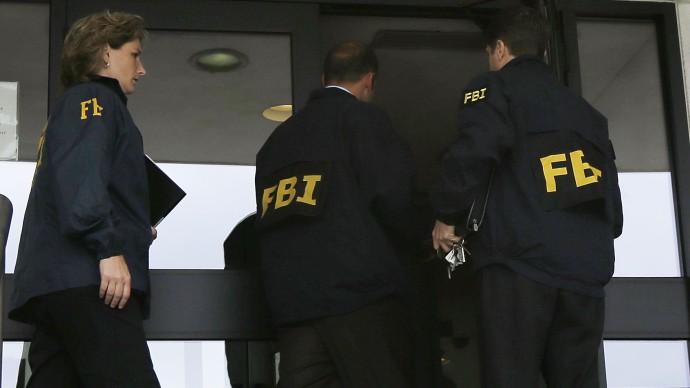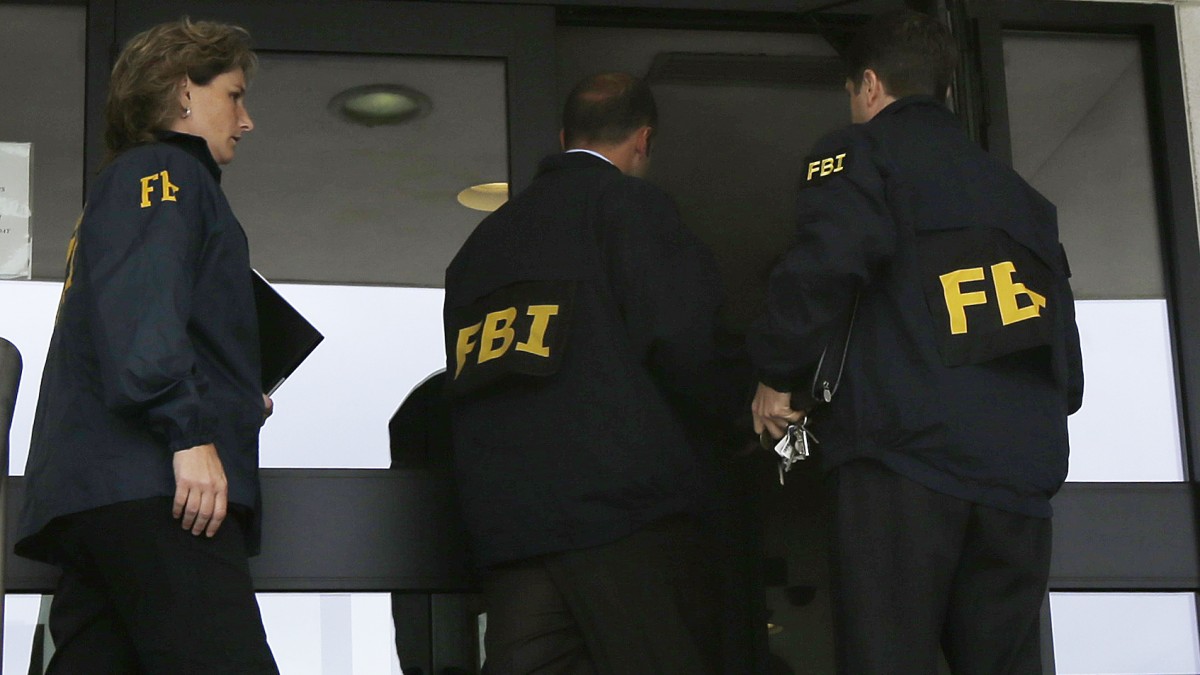
(MintPress) – In September 2010, FBI agents raided the homes of 19 anti-war and solidarity activists in Michigan, Illinois and Minnesota. The sudden seizure of books, computers, even children’s artwork sparked outrage in the activist community, leading to the formation of the Committee to Stop FBI Repression, a grassroots coalition of activists working together to fight alleged charges of providing support for terrorism.
Based in Chicago, prosecutor Barry Jonas has vowed to carry forth cases demonstrating activists have committed crimes against U.S. national security, including providing material support for terrorism. However, activists are building coalitions of supporters of all persuasions, trying to fight FBI intimidation and coercion.
2010 raids
“My wife and I were both subpoenaed. We got calls from friends in Minnesota saying that they were going to be raided. When I left the house to write a press release, I realized that I was being followed,” said Tom Burke, an anti-war activist from Grand Rapids, Mich. in a recent MintPress interview.
Burke describes that the FBI raids on his house and the houses of 70 other activists across the U.S. resulted in a massive seizure of books, computers, cameras, even children’s paintings and coloring books. The ongoing investigating regards activists supposed material support for terrorism.
“The day of the raids, I had Libertarians call me, I had Republicans call me. I had Democrats contact me. All shades of opinion were upset that they raided our homes,” said Burke.
“They were outraged that they would be so heavy handed, pointing weapons at us, stealing. Barry Jonas, he poked the hornets nest. Guess what? The hornets are out and they are angry,” added Burke.
As the prosecution pushes forward still intent on taking the cases to trial, the activist community has slowly created political pressure to drop the cases, seen by many as nothing more than a witch hunt against non-violent anti-war groups.
The issue has not garnered much attention in Washington. However, several members of Congress have sent letters to the attorney general to raise questions about the nature of the raids.
Congressman Dennis Kucinich (D-Ohio) is among 11 members of Congress to write letters of concern to Attorney General Eric Holder and President Obama, critical of the raids that have yet to result in a single conviction. The Congressional condemnation draws attention to the plight of protesters subject to arbitrary searches and arrests.
Among the criticisms voiced by Kucinich and his peers is the statute that prohibits “material support or resources” to foreign terrorist organizations, a provision that is broad, unclear and made more ambiguous with recent legislation, like the NDAA.
Political activism highlights failed foreign policy
Burke, like many of his colleagues, was handed subpoenas regarding an FBI investigation into alleged “material support for terrorism.” For Burke, his previous travels to Israel and the Palestinian territories in which he met with and interviewed members of the Popular Front for Liberation of Palestine (PFLP) put him on the FBI radar.
The PFLP is a revolutionary Marxist organization considered a terrorist organization by the U.S., EU, Canada, U.K. and Israel.
“I think it is political. The U.S. is supporting wars against the Palestinians and the Colombian people. We have had people travel to both countries meet with trade unionists, lawyers, teachers, people who are a lot like ourselves are concerned with peace and justice.
In Colombia, another area of activism, the U.S. has been supplying Bogota with millions in arms to fight the “war” on drugs and terrorism. In reality, U.S. arms are funneled into paramilitary death squads to crack down on union leaders, anti-regime activists and armed groups like the FARC.
Merely speaking to a group labeled terrorist by the U.S. has been enough to draw the scorn of the U.S. government even though war correspondents frequently speak with militants and known terrorists, a legitimate task for the free press.
“We also interviewed leaders of the groups that are in resistance fights against the U.S. empire. The government is cracking down on our right to speak out,” said Burke.
He adds, “This happened almost two years before the NDAA. The NDAA just further erodes the civil liberties and is meant to curtail our rights. They are convicting people with secret evidence, they are using secret courts to set this up.
“There is a continuing investigation with a focus on Hatem Abudayyeh from Chicago. On the two year anniversary in September we had our lawyers approach Barry Jonas, who is continuing the investigation. We asked that Jonas publicly drop the investigation and return Hatem’s belongings. Barry Jonas refused both.”
Abudayyeh has been involved in pro-Palestinian, anti-war work as an activist in Chicago. He claims that he is being targeted merely for his political beliefs. Abudayyeh has yet to be charged with a crime and has not had his personal items returned since the 2010 raid.
“Since then, we have carried forth a campaign for both points. What’s interesting is that Barry Jonas moved from Washington, D.C. to Dallas for the Holy Land Five case for the second trial,” added Burke.
The Holy Land Five case pits Arab-American charity leaders against a prosecution alleging that the American charity helping Palestinian refugees was actually supporting Hamas and other terrorist organizations.
After originally being dismissed on all charges by a jury of their peers, the Holy Land Five were later convicted on charges including providing material support to terrorism. The defendants are now appealing to the U.S. Supreme Court, claiming inconsistencies and unjust proceedings in the second trial.
Simply speaking out for Palestinians or for Colombian trade unionists is enough to draw the scorn of authorities, but public opinion is swaying, leading a new generation to speak out against censorship.
“In this country, support for Palestine is growing. It is very apparent on college campuses. Many people view Israel like we viewed Apartheid South Africa. People like Jonas are abusing their government position to try to further their own causes. The more they try to repress our voices, the more isolated they become,” added Burke.
The fight back
Winning the hearts and minds of Americans will help to build necessary political pressure, uphold free speech and support the right of journalists and activists to freely interview individuals abroad.
“I think the Obama administration, in terms of civil liberties, has continued most of Bush’s policies. In terms of civil liberties it has become much worse with the NDAA. For young Muslims, the situation has gotten worse,” added Burke.
As Burke notes, the situation has deteriorated but is not unprecedented given the history of government spying and infiltration started under FBI Director J. Edgar Hoover’s Counter-Intelligence, COINTEL, program in the 1970s.
By using subversive government spies, the FBI was able to keep tabs on the Black Panthers, Students for a Democratic Society, the American Indian Movement and a bevy of social justice organizations flourishing during the era.
While there has been relatively little recourse to challenge FBI raids and infiltration, a legal challenge filed earlier this month by several anti-war protest groups in Washington state could deal the first successful blow to domestic government spying programs.
The 9th Circuit Court of Appeals upheld a 2009 challenge this month, saying that peace activists can sue the FBI for infiltration, a violation to citizens’ First and Fourth Amendment rights.
“The U.S. government has spied on political dissidents throughout history and this particular plot lasted through two presidencies, but never before has a court said that we can challenge it the way we have,” said Larry Hildes, a lawyer representing a group of anti-war activists challenging military spying and infiltration in anti-war groups.
Activists continue to organize across the Midwest in an effort to build political pressure. On Jan. 24, the Committee to Stop FBI Repression will be holding a call in day, urging Jonas to drop the charges against anti-war activists. “If Morgan Stanley can have their case dropped, so can we,” said Burke.
Based on previous call in days, Burke estimates that “hundreds” will call in to voice their support for the accused activists and to demand that Jonas drop the charges.
“I think the key to our victory is building solidarity against the political repression. Calling Barry Jonas puts him on notice that there is a large, growing movement that he can’t oppose,” Burke said.


